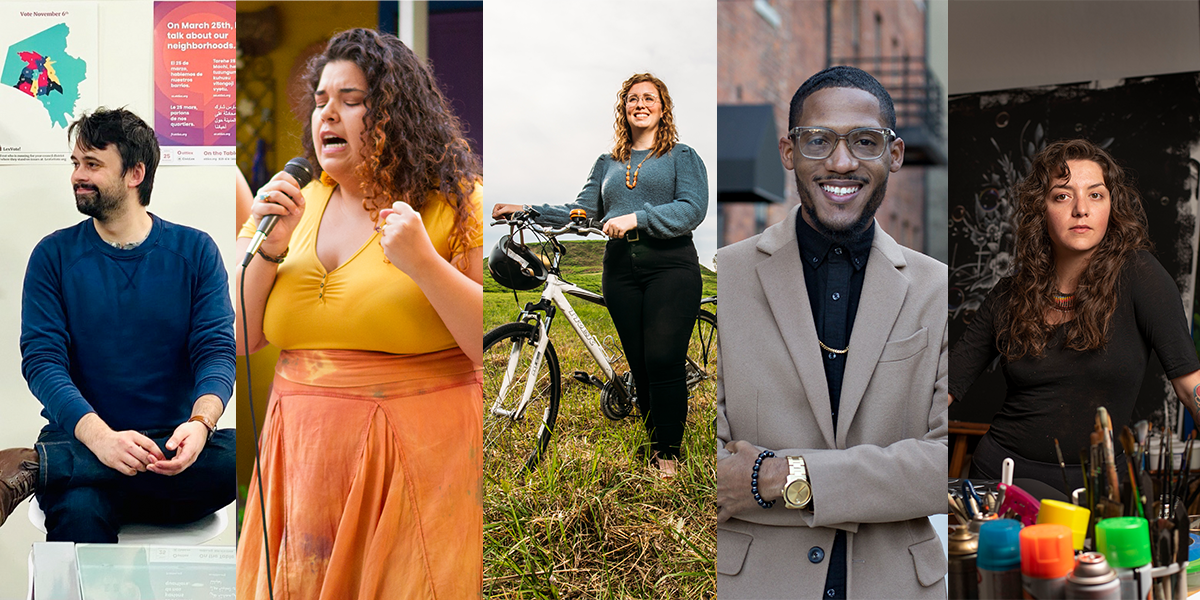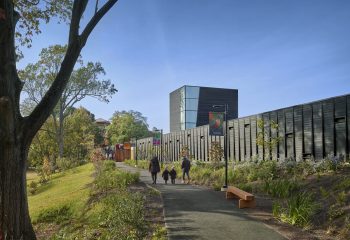
Harnessing the power of 124 innovators: How the Emerging City Champions trained young leaders to create more inclusive public spaces in their cities
8 80 Cities has had the privilege of leading and hosting the Emerging City Champions (ECC) fellowship program, funded by the Knight Foundation, since 2015.
Since its launch, the goal of the Emerging City Champions fellowship has been to invest in young leaders between the ages of 19 and 35, who have creative ideas to improve mobility, public spaces and civic engagement in their cities. With $1.5 million in commitments from Knight over the years, the program is designed to bolster the leadership capacity, skills and experiences of fellows through training and professional development and with $5,000 in seed funding for their projects.
Each Champ has a personal story that connects and motivates them to do their project. Whether it is a mural, a community beehive, an open street, a DIY bike repair, a bus stop transformation, a community songwriting project, or a simple park activation — there is a reason their project is important to them and their community. Their stories and projects reflect a deep love and care for their city and community, stories we aim to help amplify through the 8 80 and Knight networks.
For example, ECC Champion and current Knight Public Spaces Fellow Erin Salazar’s career as a city builder was accelerated with her ECC project, a community mural that led to a multi-year transformation of San Jose’s downtown.
After six incredible years, and 124 exceptional alumni, we took stock and Knight conducted an independent assessment about the program to learn about its impact on the Champions and in the cities Knight operates in. The results show the value of the program.
Of the 124 young leaders who were ECC champions from 2015 to 2020, 71% said that the experience had a great or tremendous impact on them. Overall, the ECC fellowship has resulted in tangible career growth — such as being promoted or founding an organization — for participants by providing these young leaders with increased confidence to make change in their communities. Most champions have continued working to improve public life in their communities well beyond the time of the fellowship. You can read “Cultivating Talent and Catalyzing Change” here.
From ECC’s inception, 8 80 Cities has viewed this as a program that is much more about the Champs than the project ideas. Good ideas come and go, but good leaders are harder to come by. We see this as a unique opportunity to invest in the human being behind the idea first and foremost. The seed funding is there to help them bring their project idea to life.
8 80 Cities provides each Champion with a 4-day in-person workshop in Toronto (held virtually in 2020 due to COVID-19), ongoing mentorship, leadership training and capacity building over the course of a year as the Champs implement their projects.
The independent assessment of the program, conducted by Sarah Lee Consulting, shows the value of the program for our Champions. Here are some key takeaways:
- The program has catalyzed more than 100 public space and civic engagement projects in Knight communities.
- 72% of champions have secured additional funding for a public space, civic engagement or mobility project.
- 39% have joined one or more nonprofit boards in their community.
- 54% have been promoted since their fellowship year, and 43% went on to found an organization.
- Champions are a young and racially diverse group, which challenges conventional urbanism narratives about placemaking and talent scarcity in these communities.
It’s also clear that the power of ECC could be strengthened even further with a stronger network that is more consistently managed. This could allow for more cross pollination, learning and knowledge exchange between different cohorts.
While the benefits of ECC for career growth and leadership development have been documented, these benefits have not been equally enjoyed by all participants. This recent assessment underscores the importance of even more intentional support for champions of color, in particular women of color, who were less likely to benefit from the same levels of additional project funding or job promotions as their white male counterparts over the same time period.
As we find ourselves looking back, we can’t help but think about where we are today. We are over a year into a global pandemic that has disproportionately harmed racialized communities, people living on low income, elders, people experiencing homelessness, people with disabilities, and other historically underserved communities.
We need leaders with the empathy, experience, knowledge and capacity to handle complex challenges. Our most recent cohort of Champions have used their ingenuity to push boundaries amid a global pandemic and a national reckoning on race, to reimagine and to do the hard work of building more inclusive post-pandemic cities through grassroots community-based initiatives.
This program underscores the power in investing in young emerging leaders with community driven solutions that support public life in public spaces. And that champions of public spaces are important cornerstones of creating the healthy and equitable cities we need.
Guillermo Penalosa is the founder of 8 80 Cities and Amanda O’Rourke is the executive director of the organization.
Related Content
Cultivating Talent and Catalyzing Change
An Assessment of Emerging City Champions
Photo (top): Emerging City Champions Richard Young, Gabriela Sanchez, Rachel Umana, Orlando Bailey and Erin Salazar.
Recent Content
-
Communities / Article
-
Communities / Article
-
Communities / Article






